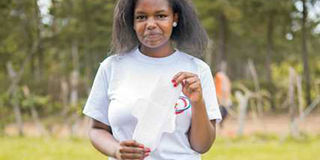Menstrual Hygiene is important, period!

Abby Chebet, 19, is collaborating with a couple of organisations and donated sanitary towels to primary school going girls. PHOTO | COURTESY
What you need to know:
While engaging the girls, we also discovered that lack of sanitary towels was standing in the way of their studies.
- Some even went to the extent of offering sex in exchange for money to buy sanitary pads.
- So far, in partnership with various organisations, we have donated pads to over 8,000 girls
During this year’s Menstrual Hygiene Day celebrated on May 28, as she has done in the past two years, Abby Chebet, 19, collaborated with a couple of organisations and donated sanitary towels to primary school going girls.
DISTURBING NEWS
Abby is the founder and CEO of the Lady’s Heart Foundation, a student-led organisation she formed in 2017, when she was just 17. The initiative, which she says was birthed out of necessity, champions for quality education in rural Kenya and creating awareness on menstrual hygiene.
“When I launched this initiative, I was a First Year student at Multimedia University where I am currently studying a Bachelor’s degree in Commerce. I was home for the long holiday when I received disturbing news that two teenage girls I had been teaching in Sunday school were pregnant and had dropped out of school as a result,” she says.
Out of the disgrace they had been subjected to, Chebet says that the girls were afraid to leave their homes, yet the pregnancies had created strife between them and their parents.
“While talking to my friends about it, I discovered that the number was actually higher than the two figures I had. I decided to start engaging with the youth on matters related to sexual education,” she says.
With support from her parents and friends from her village in Bomet County, the teenager started holding sessions on sexual education in local churches and primary schools. She got a lot of support from the community, such that by the time she resumed her studies, the initiative had extended to the neighbouring Kericho County.
MISTAKES & CHOICES
“We did not have any professional background on the subject, so we talked about our experiences, the mistakes and the choices we had made along the way,” she says.
Presently, the organisation is present in more than six counties. To expand to other counties, Abby reached out to her former classmates in primary and secondary school. A few warmed up to the idea, and together, they started the Lady’s Heart Foundation chapters in various counties.
“The organisation draws its membership from university students and recent graduates. For instance, in Nairobi County, we have the University of Nairobi chapter while in Kiambu County, we have Kenyatta University and Jomo Kenyatta University of Technology and Agriculture (JKUAT) chapters. Because we are in different counties, the leaders of the different chapters help to organise events in their specific locations,” she explains and adds,
“While engaging the girls, we also discovered that lack of sanitary towels was standing in the way of their studies and some even went to the extent of offering sex in exchange for money to buy sanitary pads, so we came up with a project to provide girls in the counties we are in with sanitary towels. So far, in partnership with various organisations, we have donated pads to over 8,000 girls. On May 28, we partnered with Medical Students Association of Kenya (SCORA) and had menstrual training in Nairobi, Bomet, Uasin Gishu, Kiambu and Meru counties. Some of the schools we have worked with include Kuryot, Kamureito, Kaptulwa and Leldok primary schools in Bomet County.
PROPER STRATEGY
Even though Lady’s Heart is not a profit-making organisation, Chebet says that starting any initiative requires proper strategy. To start with, she is a student and the Youth Governor, Bomet County. This means that she has to be good with time management and intentional aboutthe projects she undertakes.
“From the start, I wanted an initiative where we would account for impact and be consistent in our activities. To get here, we have had to analyse each other and be open in our communication. My parents have been very instrumental as they point out our mistakes and offer guidance.”
Like many organisations, one of the challenges that the initiative faces is financial constraints. She attributes this to the fact that most of the members are students who are financially dependent on their parents. They therefore help the organisation by writing proposals to various companies whenever they have a project. But managing the many universities involved in the initiative is not easy.
“Even with the challenges, I strive to make a difference in the society. My advice to young people is that they pursue their passion and seek to transform their communities,” she says.





